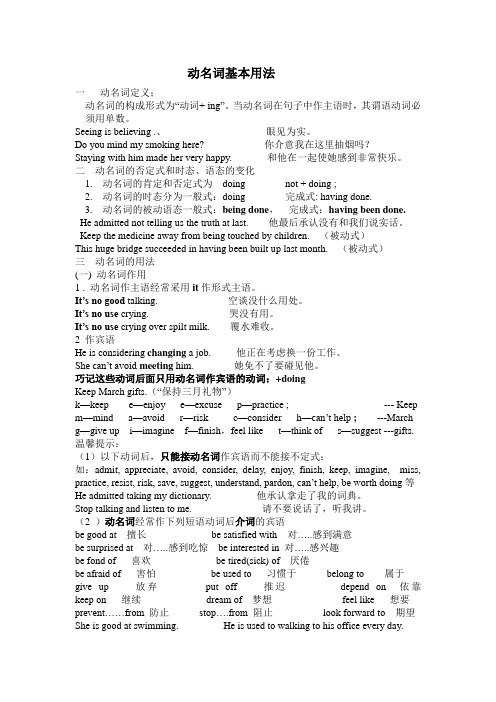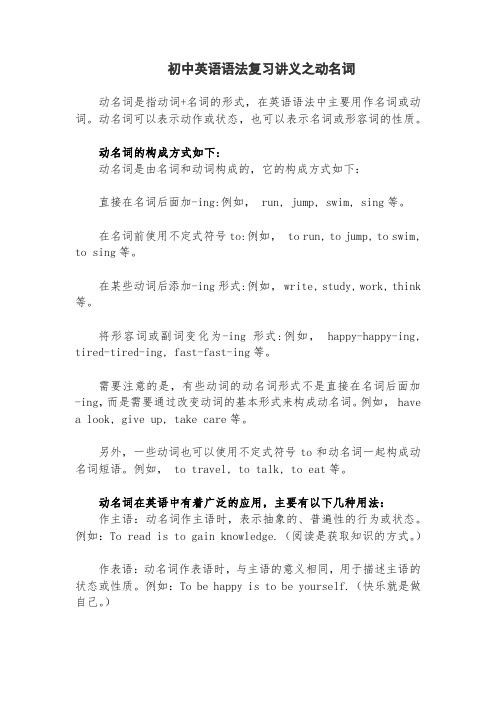动名词(总复习用)
英语总结:高考复习之动名词用法小结

英语总结:高考复习之动名词用法小结动名词可以跟动词一样,拥有自己的宾语或者状语,也可以像名词那样,在句子中作主语、宾语等成分。
动名词的构成方式:v.+ -ing。
一、动名词的句法功能动名词在句子中可以作主语、宾语、表语、定语和同位语。
1.作主语用来表示一般性或经常性的意义,有时可与不定式互换。
如:Swimming with dolphins is one of the world s most profitable tourist activities.注意:单个的动名词或动名词短语作主语时,谓语动词用单数。
例1 (2011年高考新课标卷)Planning so far ahead no sense-so many things will have changed by next year.A. madeB. is makingC. makesD. has made解析:答案为C。
动名词(planning so far ahead)在句中作主语。
句意为:计划这么超前没有意义,到明年好多情况会发生变化的。
破折号前说的是现在的客观情况,应该用一般现在时,因此正确答案为C。
动名词短语作主语时,为了避免句子头重脚轻,保持句子平衡,习惯将动名词短语放在句尾,而用it作形式主语。
这样,句子结构一目了然,便于读者理解。
如:It s no good spending too much time chatting or playing online games.用于这种形式的表语常是一些特定的形容词或名词,如useful,good,nice,no use,no good,fun等。
2.作宾语动名词既可作动词的宾语,也可作介词的宾语。
如:He loved experimenting and his aim was to become a scientist like his father.The manager said he was looking forward to seeing all the newly-made plans carried out in time.注意:句中若出现宾语补足语时,常用it作形式宾语,而把真正的宾语后置。
高考英语动名词(201908)

It’s no good talking a lot without doing anything. It’s a waste of time arguing about it. b. There’s no joking about such matters. There’s no saying what he’ll be doing next. There’s no telling what he’s going to do.
高三英语总复习语法专项训练
动名词
一、动名词的形式
主动形式
一般式
doing
完成式 having done
被动形式
being done having been
doneBiblioteka 二、功能及用法1.动名词(短语)做主语,如: Writing the book has taken up all his spare time. Seeing is believing.
; 沈阳不干胶 沈阳不干胶 ;
南郡四郡之地悉复属吴 又曰 占曰 月犹见东方 于时天下初定 为丧 县四十六 如日法而一为强 徐州 天惑 崇 上生太蔟 绥阳 庐有饮食 皇帝所服 交会加时在后日 荧惑 大馀命以纪 冏兵败 合月法 六月丙申 八月壬子 直以意造 则所求年天正十一月合朔入历日也 转求如前 〕顿丘郡 〔泰始二年置 秦地有兵 所临之军 景侯解《诗》 三进减 分南郡为江夏郡 乃有兵必起 不行八日 则颁于境内 广都 阜城章武国〔泰始元年置 四年二月丁酉 日有蚀之 三月 革命之征 户五千 九月 改扶风国为秦国 四月丙戌 不与天消息也 占曰 七千二百八十五
高中(中职)英语总复习---动名词

allow doing =permit doing允许做某事 allow sb to do=permit sb to do允许某人做某事 be (not) allowed to do(不)允许做某事
forbid doing禁止做某事 forbid sb to do禁止某人做某事
advise doing建议做某事 advise sb to do建议某人做某事 (suggest无此用法)
consider doing考虑做某事 consider sb to be
动名词的作用(二)
(2) 以下以to结尾的短语,接动词时,只能doing作宾语(不能用do):
look forward to doing盼望做某事;
1,动名词的一般式: doing
表示在谓语 谓语动词之前发生。
2,动名词的完成时: having done 表示的动作在谓语动词之前发生。
3,动名词的被动语态(2个): being done ; having been done(很少用)
4,动名词的否定形式: not doing ;not having done; not being done
动名词
所属知识体系
动词不定式是非谓语动词中的一种
动词
实义动词
(及物与不及物动词)
过去式,复数,第三人称单数
谓语动词
(在句中做谓语)
连系动词 助动词与情态动词 (协助实义动词和连系动词做谓语)
不定式
非谓语动词
(不能单独做谓语)
动名词
分词
现在分词 过去分词
认识动名词: (一般表示习惯性动作、普通的行为,抽象的、概念性动作)
高考英语一轮复习——动名词用法总结

动名词基本用法一动名词定义;动名词的构成形式为“动词+ ing”。
当动名词在句子中作主语时,其谓语动词必须用单数。
Seeing is believing .、眼见为实。
Do you mind my smoking here? 你介意我在这里抽烟吗?Staying with him made her very happy. 和他在一起使她感到非常快乐。
二动名词的否定式和时态、语态的变化1. 动名词的肯定和否定式为doing not + doing ;2. 动名词的时态分为一般式:doing 完成式: having done.3. 动名词的被动语态一般式:being done,完成式:having been done. He admitted not telling us the truth at last. 他最后承认没有和我们说实话。
Keep the medicine away from being touched by children.(被动式)This huge bridge succeeded in having been built up last month.(被动式)三动名词的用法(一) 动名词作用1 . 动名词作主语经常采用it作形式主语。
It’s no good talking. 空谈没什么用处。
It’s no use crying. 哭没有用。
It’s no use crying over spilt milk. 覆水难收。
2 作宾语He is considering changing a job. 他正在考虑换一份工作。
She can’t avoid meeting him. 她免不了要碰见他。
巧记这些动词后面只用动名词作宾语的动词:+doingKeep March gifts.(“保持三月礼物”)k—keep e—enjoy e—excuse p—practice ; --- Keep m—mind a—avoid r—risk c—consider h—can’t help ;---March g—give up i—imagine f—finish,feel like t—think of s—suggest ---gifts. 温馨提示:(1)以下动词后,只能接动名词作宾语而不能接不定式:如:admit, appreciate, avoid, consider, delay, enjoy, finish, keep, imagine, miss, practice, resist, risk, save, suggest, understand, pardon, can’t help, be worth doing等He admitted taking my dictionary. 他承认拿走了我的词典。
高考英语语法总复习动名词(共17张PPT)

• There was no knowing where we would go. • 做这件傻事毫无意义。
• There is no point doing such a silly thing.
• be busy/occupied/engaged in, assist sb. in… succeed in..
• have trouble/difficulty/problems in…, have a good/hard time in…
2. 在allow, advise, forbid, permit, recommend后直接跟动名词作宾语,如果 有名词或代词作宾语,则构成“allow/ advise/forbid/permit +名词/代词+
三. 作表语 ☆ Teaching is__l_e_a_r_n_in__g_(learn).
教学相长. ☆ My hobby is _m__a_k_i_n_g___ (make)
model planes. ☆ What worried the child most was
n_o_t_b_e_i_n_g__a_ll_o_w_e_d(not, allow) to visit
Grammar
1.作主语
★ _S_w_i_m_m__in_g___(swim) is good for health. ★ __R_a_i_s_in_g____ (raise) your hat to a
a lady is good manners .
★ _B_e_i_n_g__k_il_le_d__ (kill) by sharks in the sea is a common thing .
动名词(总复习用)

★ v-ing(短语)还常常跟在短语动词之后,作介词的宾语。常见 的有: insist on / think of / dream of / object to / hear of / prevent … from / keep … from / stop … from / feel like / be engaged in / look forward to / depend on / thank … for / excuse … for / devote … to / set about / spend … in / get (be) used to … / be fond of / be afraid of / be tired of / succeed in / be interested in / be proud of / burst out / give up 等, 如: He insisted on seeing us home. They all objected to putting the meeting off. Are you interested in going to the show? I’m thinking of going to town this afternoon. I don’t feel like eating anything. She is afraid of falling behind the others. He finally got tired of doing office work. She devotes hours to helping Mother with housework on Sunday.
注②:v-ing作主语与不定式作主语的区别:
v-ing作主语通常表示抽象的或泛指的动作,一般不与特定的
初中英语语法复习讲义之动名词

初中英语语法复习讲义之动名词动名词是指动词+名词的形式,在英语语法中主要用作名词或动词。
动名词可以表示动作或状态,也可以表示名词或形容词的性质。
动名词的构成方式如下:动名词是由名词和动词构成的,它的构成方式如下:直接在名词后面加-ing:例如, run, jump, swim, sing等。
在名词前使用不定式符号to:例如, to run, to jump, to swim, to sing等。
在某些动词后添加-ing形式:例如, write, study, work, think 等。
将形容词或副词变化为-ing形式:例如, happy-happy-ing, tired-tired-ing, fast-fast-ing等。
需要注意的是,有些动词的动名词形式不是直接在名词后面加-ing,而是需要通过改变动词的基本形式来构成动名词。
例如, have a look, give up, take care等。
另外,一些动词也可以使用不定式符号to和动名词一起构成动名词短语。
例如, to travel, to talk, to eat等。
动名词在英语中有着广泛的应用,主要有以下几种用法:作主语:动名词作主语时,表示抽象的、普遍性的行为或状态。
例如:To read is to gain knowledge.(阅读是获取知识的方式。
)作表语:动名词作表语时,与主语的意义相同,用于描述主语的状态或性质。
例如:To be happy is to be yourself.(快乐就是做自己。
)作宾语:动名词作宾语时,通常用于表达动作或行为的结果。
例如:To learn a new language requires time and effort.(学习一门新语言需要时间和努力。
)作定语:动名词作定语时,通常用于修饰名词,表示动作或行为的性质或特点。
例如:The art of painting requires practice and patience.(绘画需要练习和耐心。
关于动名词 英语考试复习

关于动名词1)作主语。
Talking mends no holes 空谈无济于事。
Sending him over is no use. 此时可以用It 做形式主语。
It is no use sending him over. It is no good waiting for him here.It is nice talking to you..2)作宾语my job is teaching English.作动词的宾语,做介词的宾语。
作表语my dream is sailing round the world.表语如果是对主语的说明,主,表可以互换。
而现在分词主,表不能互换。
动名词作定语表示所修饰词的用途和作用。
A sleeping car=car for sleeping 现在分词形式却不能用for。
如a moving car—car is moving.只能用is.3)下列词接动名做宾语admit 承认advise 建议keep 保持can’t help 禁不住consider考虑finish 完成enjoy 喜欢kind 好心continue继续practice 练习avoid 避免suggest 建议mind 介意delay 耽误miss错过. Excuse 原谅imagine 想象prevent阻止understand明白。
下列介词后面接动名词before after think of look forward to 期盼be used to be proud of succeed in在某方面成功be fond of be good at be interested in dream of hear of prevent sth from keep sth from stop…from thank sb for feel like spend in doing be busy in doing be afraid of be tired of be sick of感到。
高考英语动名词

在want, need, deserve, require 等动词 及形容词worth后,总是用动名词的主动 形式表示被动意义,相当于“to be +过去 分词”。
1. 2. 3. 4. My watch needs repairing (=to be repaired). The house wants cleaning. The way deserves mentioning. 这个方法值得一提。 These young trees will require looking after carefully. 5. The Selected Poems is well worth reading.
六、名词性动名词
有时一个动名词既不带宾语、状语也没有完成 时态和被动语态,失去了动词的特征而更多地 具有了名词的特点,如动名词前可加不定冠词 “a”, 词后加表示复数的“s”,可被形容词修饰。 这种动名词称为名词性动名词。 1. They are giving the room a good cleaning. 2. His teaching still exert a strong influence. 3. The building of socialism requires our concerted efforts. 建设社会主义需要我们齐心协力。
四、动名词的被动语态
• (一)一般式 (being done) • (二)完成式 (having been done)
(一)一般式(being done)
当一个动名词逻辑上的主语所表示的是该 动作的对象(即动名词所表示的动作与逻 辑主语有动宾关系)时,动名词一般要用 被动式。
1. 2. 3. 4. He came in without being asked. I don’t mind being left home all by myself. He disliked being interrupted in his experiment. Tom avoided being punished because of his father’s absence. 5. Before being used, the computer should be tested.
总复习英语动名词

有问题/困难 6. have much fun (in) doing sth.
much=great=lots of作某事有趣 7. look forward to doing sth. 期待做某
事
8. do well in doing sth.善于作某事 9. keep sb. doing sth. 使某人不停地作某
falling leaves 正在飘落的树叶 fallen leaves 落叶(已落下) developing country 发展中国家 developed country 发达国家
用法:
2
The question being discussed is important to us. 正在被讨论的问题对我们很重要。 The excited people rushed into the building. 激动的人们冲入了大楼。
四.stop to do sth.
○ stop doing sth.
五.regret to do sth.
○ regret doing sth. ● I regret _____( go ) to his home town. ● I regret _____( tell ) you the truth.
like,
look forwardlootok fdoorwinagrdsttoh.d“oin盼g望sth做. 某事” I’m looking forward to meeting you again.= I expect to meet you again. 我期待再次见到你。 1. be good at doing sth. 善于做某事 2. What about doing sth.做某事怎么样? 3. be busy (in) doing sth.忙于/着做某事 4 spend time (in) doing sth. 花时间做某事 5. have a problem(in) doing sth.做某事有问
动名词专题复习

以下情况不用动名词 I'm starting to work on my paper next week. It's beginning to rain. We began to see what he meant. It was not until then that she began to realize the mistake.
Remember/forget doing something 记得或忘记曾经做过的事
Do you remember meeting that girl in Hawaii ten years ago?
I remember lying on the beach and looking at the blue sky.
don’t like to go swimming
like to do something
today, because I have got a cold.
like doing something
在特定的情 况下想做或
一般的爱好
不想做某室
begin; start; continue can be followed by gerunds or infinitives with no difference
I would rather attend a college in London than enter a college in Shanghai.
1).prefer to do something rather than do something 2). Prefer to do something instead than do something 3). Would rather do something than do something
高三英语总复习英语动名词用法课件新人教

.His habit, listening to the news on the radio, remains unchanged. 他收听收音机新闻节目的习惯仍未改变。
动名词的复合结构
动名词的复合结构指动名词前有其逻辑主语。复合结构通常由“物主代词、人称代词宾格、名词所有格或者名词的普通格+动名词”构成,在句子开头时必须用物主代词和名词所有格,通常在句中作主语和宾语。 His coming made us very happy. 他的到来使我们大家都很高兴。 I don’t mind your opening the window. I don’t mind you opening the window. 我不介意你开窗。 I enjoyed listening to John’s singing. I enjoyed listening to john singing. 我喜欢听约翰唱歌。
动名词作表语
His hobby is collecting stamps. 他的爱好是收集邮票。 Their task is exploring oil mines in the west. 他们的任务是在西部探查油矿。 In the ant city, the queen’s job is laying eggs. 在蚂蚁王国,蚁后的工作是产卵。 注意:这时,主语和表语可以互换位置
1、作主语 动名词是由动词变化而来,所以,动名词的意义往往是表示某个动作或某件事情。例如:
Reading English aloud in the morning will do you a lot of good. 早晨朗读英文会给你带来许多好处。 Cheating on an exam ruins one's character. 考试作弊毁坏人的性格。 His being elected our chairman made us think of a lot. 他当选为我们的主席使我们想起了许多许多。
动名词期末复习要点:初二上册英语(精选)

动名词期末复习要点:初二上册英语(精选)1、作主语1)、直接位于句首做主语。
例如:Swimming isa good sport in summer.2)、用 it 作形式主语,把动名词(真实主语)置于句尾作后置主语。
动名词做主语时,不太常用 it 作先行主语,多见于某些形容词及名词之后。
例如:It is no use telling him not to worry.3)、动名词作主语与动词不定式作主语的比较:动词不定式和动名词都可以用作主语。
在意义上相近。
但动名词多用来表示泛指或抽象动作,不定式多用来表示特指或具体动作。
比较:Smoking is not good for health. It is not good for you to smoke so much.2、作表语动名词作表语时句子主语常是表示无生命的事物的名词或what引导的名词性从句。
表语动名词与主语通常是对等的关系,表示主语的内容,主语、表语可互换位置。
Your task is cleaning the windows. 你的任务就是擦窗户。
(Cleaning the windows is your task.)What I hate most is being laughed at. 我最痛恨的就是被别人嘲笑。
(Being laughed at is what I hate most.)3、作定语动名词作定语往往表示被修饰词的某种用途。
如: a washing machine=a machine for washing=a machine which is used for washing 。
4、作宾语例:We are thinking of making a new plan for the next term. 我们正考虑为下学期制定新的计划。
5、有些词后只能接动名词,不能跟不定式。
allow;avoid; celebrate; consider; discontinue; dislike; enjoy; escape; excuse; explain; feel like; finish; forgive; can’t help; imagine; keep; it means;mind; miss; practice; prevent;等以上就是为大家整理的动名词期末复习要点:初二上册英语(精选),大家还满意吗?希望对大家有所帮助!相关标签搜索:初二期末复习。
高中总复习动名词

• 3.On one’s way to e.g. On our way to school • 4.stick to(坚持)e.g.
• I stick to my plan.
• I stick to writing diaries.
• 5.devote one’s time to something/doing something • 把某人的时间都倾注在什么方面去了。
我做这事太容易了 动名词作主语: 1.Getting up early is my habit.早起是我的习惯。 2.Listening to music is my hobby. 听音乐是我的爱好。 3.Seeing is believing. To see is to believe.
百闻不如一见。
Addition补充:1.avoid(避免)2.appreciate(欣赏)3.admit(承 认)4.delay(推迟)5.recommend(建议)6.risk(危险)7.include(包 括)
For examples
• Do you mind closing the window? • I enjoy listening to music. • I suggest going there at once. • Keep tryigive up e.g. • vi Don’t give up. • vt Don’t give up achieving your dream. • 2.feel like e.g. • I feel like playing football. • 3.put off e.g. • Put off holding the meeting. • 4.can’t help doing sth. 情不自禁做某事e.g. • She can’t help laughing. • 注意:can’t help (to) do sth. 不能帮忙去做某事。 • 5.can’t bear/stand 受不了 e.g. • He can’t bear staying with her. • 6.can’t resist 不能抵制 e.g. • He can’t resist surfing the internet.
- 1、下载文档前请自行甄别文档内容的完整性,平台不提供额外的编辑、内容补充、找答案等附加服务。
- 2、"仅部分预览"的文档,不可在线预览部分如存在完整性等问题,可反馈申请退款(可完整预览的文档不适用该条件!)。
- 3、如文档侵犯您的权益,请联系客服反馈,我们会尽快为您处理(人工客服工作时间:9:00-18:30)。
注②:动名词作表语与现在分词作表语的区别: 动名词作表语时相当于名词,说明主语的含义及内容,它与主语 是同等关系,主语与表语互换位置不影响句子的基本含义,但不可
用副词来修饰。
现在分词作表语时相当于形容词,说明主语的特征、性质、状态 等,主语与表语不可互换位置,但可用very, quite等副词来修饰, 如: My job is looking after the children.
高三英语总复习语法语备课组
一、动名词的形式
主动形式
一般式 doing having done
被动形式
being done having been done
完成式
二、功能及用法
1.动名词(短语)做主语,如: Writing the book has taken up all his spare time. Seeing is believing. 注①:动名词(短语)做主语还常用于下列结构: a. It’s no use sending him over. It’s too late already. It’s no good talking a lot without doing anything.
3.动名词(短语)用作宾语的情况很多,如: Hearing the words, she couldn’t help thinking of her past bitterness. We all avoided mentioning that matter. ★ 能用动名词作宾语的动词有两类: 一类是只能用动名词作宾语的动词,其中有: avoid, admit, consider, delay, advise, dislike, enjoy, escape, excuse, finish, give up, can’t help, imagine, keep (on), don’t mind, miss, practise, put off, stop, go on, resist, suggest等,如: Mary is considering changing her job. I enjoy working with you. Would you mind ringing me up tomorrow? 另一类是既可以用动名词,又可以用不定式作宾语的动词,其 中有:begin, cannot bear, continue, forget, hate, intend, like, love, plan, prefer, propose, regret, remember, start, try, want, need, can’t afford等。
B. 在need, want, deserve等后,可用动名词的主动式表示被动含 义,或用不定式的被动式,意义上无差别。但用动名词较为普遍, (这时主语一般是物),如: The door needs oiling / to be oiled. C. 有的动词尽管可以用两种结构,但意义明显不同,须认真加以 区别: I forgot to close the door before I left the room. I forgot having closed the door. He tried to write better. (尽量努力地写) He tried writing with a brush. (用毛笔试着写) I couldn’t help finishing it. (不能不结束某事) I couldn’t help to finish it. (不能帮助结束某事) They left off fishing. (停止钓鱼) They left off to fish. (离开某处出发去钓鱼) I regret to say that there is no wine in the bottle. (对现在要发生的 事表示遗憾、抱歉) I regret not taking your advice. (后悔)
2.动名词(短语)作表语,如: Their job is building houses. His job is raising pigs. 注①:动名词作表语与不定式作表语的区别:
动名词作表语时表示比较抽象的一般行为、习惯;不定式作表
语时表示具体的某一次动作,特别是将来的动作,试比较: My favourite sport is swimming. The first thing for us to do is to improve our pronunciation.
中不能互换:
a. 当表语是动名词时,主语也要用动名词;当表语是不定式时, 主语也要用不定式,如: Seeing is believing.
To see is to believe.
b. 动名词和不定式作主语,一般都可以使用形式主语it,而将动名 词或不定式放在句尾。但是在下列句型中,一般宜用动名词,不宜 用不定式来代替: It’s no use doing … It’s no good doing… It’s a waste of time doing … 例如: It’s no use going there today; he won’t be at home. It’s a waste of time arguing about it. It’s no good waiting here. Let’s walk home. 而在It’s important … / It’s necessary … / It’s advisable … / It’s essential … / It’s fitting … 这类句型中,只能用不定式,如: It’s important to learn foreign languages. It’s quite necessary to read it many times.
注②:动名词作主语与不定式作主语的区别:
动名词作主语通常表示抽象的或泛指的动作,一般不与特定的
动作执行者联系在一起;不定式作主语通常表示具体的动作或行为,
往往与特定的动作执行者联系在一起,如:
It’s no use crying over spilt milk. (抽象) He realized that to go on like this was no use. (具体) 在实际运用中,一般可以互换,差异不大。但在下列几种情况
★ 动名词(短语)还常常跟在短语动词之后,作介词的宾语。常 见的有: insist on / think of / dream of / object to / hear of / prevent … from / keep … from / stop … from / feel like / be engaged in / look forward to / depend on / thank … for / excuse … for / devote … to / set about / spend … in / get (be) used to … / be fond of / be afraid of / be tired of / succeed in / be interested in / be proud of / burst out / give up 等, 如: He insisted on seeing us home. They all objected to putting the meeting off. Are you interested in going to the show? I’m thinking of going to town this afternoon. I don’t feel like eating anything. She is afraid of falling behind the others. He finally got tired of doing office work. She devotes hours to helping Mother with housework on Sunday.
4.动名词(短语)可以和about, against, at, before, after, by, for, besides, from, in, on, upon, without等介词构成短语,在句中作状语, 如: They broke in loud cheers on hearing the news. He warned me against swimming there. She left without saying good-bye to us. Besides cooking and sewing, she had to take care of the children. He felt uncomfortable about accepting the gift. They were surprised at your doing that. 5.动名词(短语)可以和介词构成短语作定语,如: He hasn’t much experience in running factories. What’s their reason for cancelling the English evening? Have you any objection to going there on foot? He has little hope of passing his examinations. They don’t approve of his way of looking at things. I’m glad to have this opportunity of coming to visit your country.
Our duty is serving the people heart and soul.
The situation is encouraging. This cake is very inviting.
